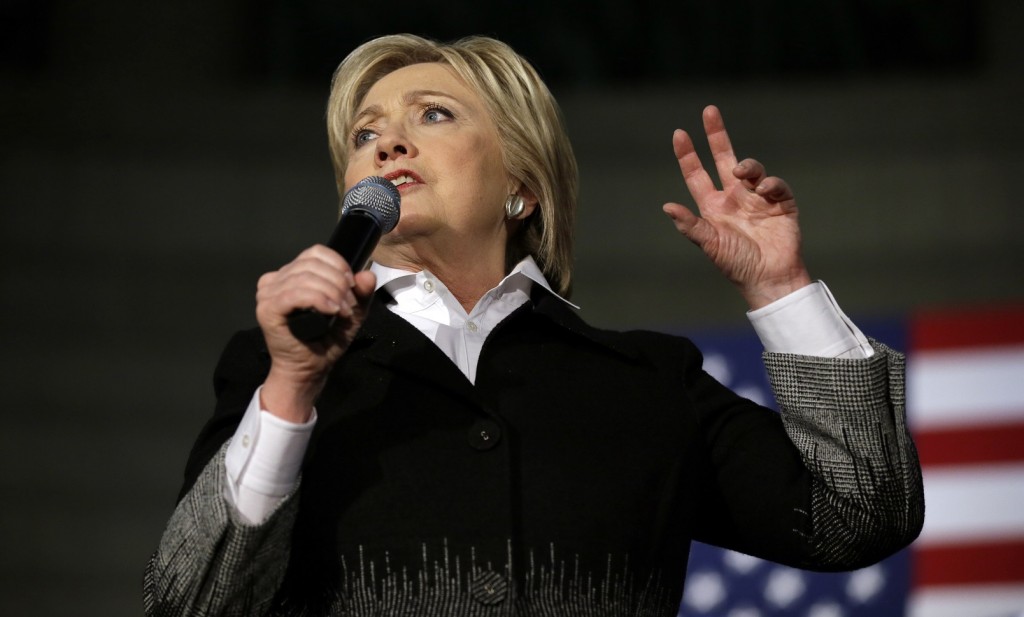- California Assembly OKs highest minimum wage in nation
- S. Korea unveils first graphic cigarette warnings
- US joins with South Korea, Japan in bid to deter North Korea
- LPGA golfer Chun In-gee finally back in action
- S. Korea won’t be top seed in final World Cup qualification round
- US men’s soccer misses 2nd straight Olympics
- US back on track in qualifying with 4-0 win over Guatemala
- High-intensity workout injuries spawn cottage industry
- CDC expands range of Zika mosquitoes into parts of Northeast
- Who knew? ‘The Walking Dead’ is helping families connect
Clinton carries Mississippi; Trump, Cruz in tight GOP race

Democratic presidential candidate, Hillary Clinton speaks during a rally at the Charles H. Wright Museum of African American History, Monday, March 7, 2016, in Detroit, Mich. (AP Photo/Charlie Neibergall)
LANSING, Mich. (AP) — Hillary Clinton claimed victory Tuesday night in Mississippi, padding her lead in the Democratic presidential primary and highlighting anew her strength with black voters who will be crucial to her party’s prospects in the general election.
The Republican race in Mississippi was a two-man race between Donald Trump and Ted Cruz, too close to call as polls closed. Both parties were also holding primaries in Michigan, while the GOP was holding caucuses in Idaho and Hawaii.
Michigan, the night’s biggest prize, was the first industrial Midwestern state to have its say in the 2016 primaries. Trump, the GOP front-runner, was seeking to assert his strength with the state’s white, working-class voters, as was Democrat Bernie Sanders, underscoring the surprising candidates’ overlapping populist appeal.
Sanders, however, has struggled to expand his support, and his troubles with black voters were evident once again Tuesday. Clinton won nearly 9 in 10 black voters in Mississippi and also made inroads with groups that have been supporting Sanders, including liberals, according to exit polls.
Trump entered Tuesday’s contests with a solid lead in the delegate count. But he’s facing a barrage of criticism from rival candidates and outside groups desperate to block him from becoming the GOP nominee. And his recent losses to Cruz, the Texas senator, have raised questions about his durability and given fresh hope to other competitors.
Ohio Gov. John Kasich hoped to mount a strong challenge to Trump in Michigan, Tuesday’s biggest prize. Kasich has yet to win a primary but hoped a good showing in Michigan would give him a boost heading into next week’s crucial contest in his home state.
Speaking to a crowd in Lansing, Kasich said a strong showing in Michigan would show the country “that it’s a new day in this presidential campaign.”
To that end, Kasich and Florida Sen. Marco Rubio were using recorded phone calls from Mitt Romney to appeal to voters as they headed to the polls. Romney, the 2012 GOP nominee, has not endorsed a candidate but has vowed to help challengers to Trump, who he says would be dangerous for the country.
GOP candidates were fighting for 150 delegates Tuesday, while 179 Democratic delegates were at stake in the party’s two primaries.
The economy ranked high on the list of concerns for voters heading to the polls in Michigan and Mississippi. At least 8 in 10 voters in each party’s primary said they were worried about where the American economy is heading, according to exit polls conducted by Edison Research for The Associated Press and television networks.
Among Democrats, 8 in 10 voters in both states said the country’s economic system benefits the wealthy, not all Americans.
Sanders has sought to tap into that concern, energizing young people and white, blue-collar voters with his calls for breaking up Wall Street banks and making tuition free at public colleges and universities. Michigan, with big college towns and a sizeable population of working-class voters, should be a good fit for him. But Clinton has led in polling.
Tuesday’s contests are a prelude to next week’s high-stakes primaries in Florida and Ohio. Like Kasich, Rubio must win his home state in order to remain a viable contender.
“It has to happen here, and it has to happen now,” Rubio told supporters Tuesday during a rally in Sarasota.
Rubio has received endorsements from a steady stream of senators, governors and other high-profile Republican officials. But his backing from voters has lagged, and he entered Tuesday’s contests with just a pair of victories in the Minnesota caucuses and Saturday’s Puerto Rico primary.
If Rubio and Kasich can’t win at home, the GOP primary appears set to become a two-person race between Trump and Cruz. The Texas senator is sticking close to Trump in the delegate count and with six states in his win column, he’s arguing he’s the only candidate standing between the brash billionaire and the GOP nomination.
During a campaign stop at a North Carolina church Tuesday, Cruz took on Trump for asking rally attendees to pledge their allegiance to him. He said the move strikes him as “profoundly wrong” and is something “kings and queens demand” of their subjects.
“I’m not here asking any of you to pledge your support of me,” Cruz said, to thunderous applause and cheers. “I’m pledging my support of you.”
Some mainstream Republicans have cast both Trump and Cruz as unelectable in a November face-off with the Democratic nominee. But they’re quickly running out of options and are increasingly weighing long-shot ideas such as a contested convention or rallying around a yet-to-be-determined third-party candidate.
Heading into Tuesday, Trump led the Republican field with 384 delegates, followed by Cruz with 300, Rubio with 151 and Kasich with 37. Winning the GOP nomination requires 1,237 delegates.
Among Democrats, Clinton had accumulated 1,134 delegates and Sanders 502, including superdelegates. Democrats need 2,383 delegates to win the nomination.












![일본 사도광산 [서경덕 교수 제공. 재판매 및 DB 금지]](http://www.koreatimesus.com/wp-content/uploads/2024/07/PYH2024072610800050400_P4-copy-120x134.jpg)


